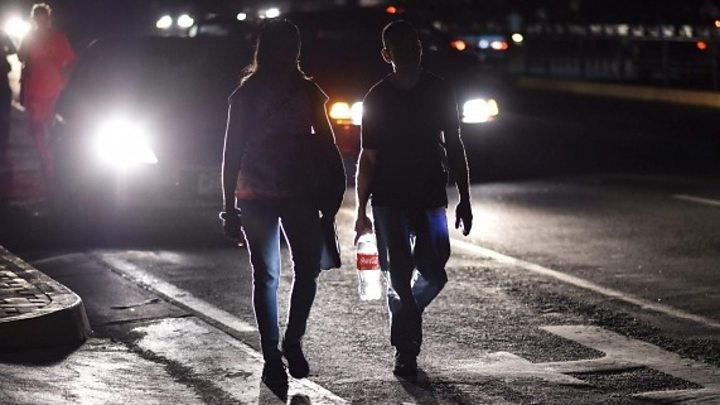
by BBC
Most of Venezuela has been hit by an electricity blackout.
The power cut plunged the capital Caracas into almost complete darkness during rush hour on Thursday, before extending to other areas.
The government of President Nicolás Maduro has blamed the opposition, accusing them of sabotage.
It comes amid rising tensions over opposition efforts – backed by the US and some Latin American countries – to remove Mr Maduro from power.
Thousands of people had to walk home in the capital Caracas on Thursday evening
The lack of electricity has caused flights to be diverted from the main airport in Caracas, where thousands of workers were forced to walk home.
Venezuela depends on its vast hydroelectric infrastructure, rather than its oil reserves, for its domestic electricity supply.
- Chamisa under fire over US$120K donation
- Mavhunga puts DeMbare into Chibuku quarterfinals
- Pension funds bet on Cabora Bassa oilfields
- Councils defy govt fire tender directive
Keep Reading
However, decades of underinvestment have damaged the major dams, and sporadic blackouts are commonplace.
Mr Maduro accuses opposition leader and self-declared interim president Juan Guaidó of trying to mount a coup with the help of “US imperialists”.
Mr Guaidó said the blackout was a matter of “chaos, concern and anger” and “evidence of the usurper’s inefficiency”.
Caracas and most of the rest of the country have no power
“Light would return” once Mr Maduro was removed from power,” he said.
US Secretary of State Mike Pompeo also weighed in, blaming the “Maduro regime’s incompetence”.
“No food. No medicine. Now, no power. Next, no Maduro,” he tweeted.
Why do blackouts happen in Venezuela? Blackouts are nothing new in Venezuela. Critics say they have been getting worse since the nationalisation of the power grid in 2007.
In 2016, the problem reached such a critical level that the government declared a 60-day nationwide state of emergency.
In an attempt to stem the country’s chronic power shortages, the government has periodically enforced controlled blackouts, where they would switch the power off for up to six hours at a time.
Critics say that, far from helping, this has caused perishable food to go bad and crime to run rampant.
And when unplanned blackouts – such as the latest one – have happened, officials have blamed a number of different outside forces.
Last October, Electricity Minister Luis Motta Dominguez posted on Instagram that outages were caused by “animals such as rats, mice, snakes, cats, squirrels” getting into the hydroelectric system’s substations on – before adding that “of course iguanas are included”.
A few months earlier another senior official, Lisandro Cabello, said the power cuts were caused by the country’s position near the Equator. He said the fact that “we are very close to the Sun” means more intensive use of power in Venezuela than in other countries.
What’s the background to the political crisis? Mr Maduro took over the presidency when his late mentor Hugo Chavez died in 2013. In recent years Venezuela has experienced an economic collapse, with severe food shortages and inflation reaching at least 800,000% last year.
The Maduro government is becoming increasingly isolated as more and more countries blame it for the economic crisis, which has prompted more than three million people to leave Venezuela.
Media captionJuan Guaidó was greeted by thousands of supporters on his return on Monday Mr Guaidó, who leads the opposition-controlled National Assembly, declared himself interim president on 23 January and has been at loggerheads with President Maduro ever since.
He has been recognised as interim president by more than 50 countries but Mr Maduro retains the support of his close allies Russia, Cuba and China among others.











